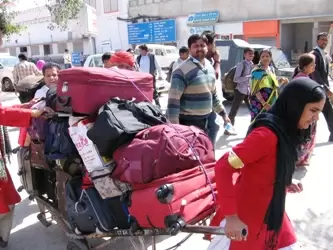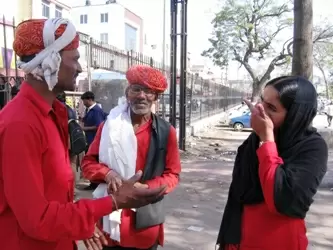Porter No 15 of Jaipur has a poignant story to share
05-April-2014
Vol 5 | Issue 14
In the hustle and bustle of a railway station, one needs grit and courage to survive as a porter. Right from negotiating a fee with passengers to carrying heavy loads on the head while expertly weaving one’s way through the jostling crowds, the job is all about tough work, patience and people skills.
For a lone woman porter, trying to make a place for herself in this completely male-dominated profession, the burden – not just physical but emotional and psychological as well – is only bigger.
 |
|
Manju, 34, is the first female porter at the Jaipur Railway Station (Photos: Abha Sharma WFS)
|
Manju, 34, works at the Jaipur Railway Station in Rajasthan’s state capital. She is the lone female porter of the 177-strong porter force working there.
A mother of three, she was living a quiet, carefree life in the village of Sunderpura village in Jaipur district’s Phulera block, until the sudden death of her husband turned her world upside down.
Mahadev, who was a porter, had an untimely demise due to liver dysfunction. It was his income that had enabled Manju to feed her family and educate her two daughters and one son.
With her husband dead and no support from his family, how could this 34-year-old with little education and three children, survive with dignity?
Pushed into a corner, Manju packed her bags around a year ago and moved to Jaipur with her children. With the help of her husband’s former colleagues, she approached the Northern Western Railway authorities to find out if she could get his job.
Says the young woman, “My only brother and six sisters barely manage to fend for themselves so how could they feed me and my children? That’s when I took the tough decision to step out of the home and work.
“It was not that I liked the idea of becoming a porter but sheer necessity drove me to this male bastion. How I wished I had been educated enough to take up a small job in an office but I realised for an illiterate woman from the village there were not many options to earn a decent living.”
The railway authorities had no real objections to her signing up. So, after a brief training stint, Manju donned Mahadev’s Badge No. 15 and was ready to start her new life as a working woman.
During the first six months Manju says she “cried more and worked less”, constantly questioning her decision, doubting her abilities and wondering whether she would ever be any good at being a porter.
“Initially, even a small suitcase seemed like a mountain to me. But it wasn’t just the physical strain that was pulling me down; I was unable to get over my hesitation of working with men. I hardly ate or slept properly and as a result got really sick. I even had to be hospitalised for a few days,” she reveals.
This was when her mother came to spend some time with her. “She counselled me a lot and told me to buckle down and get over my inhibitions. By then I too was gradually coming to terms with the reality and decided to give this profession a serious go,” she adds. From then on things became better.
Once she was back at the station she started interacting more with her male colleagues and with their support and under the guidance of the president of the coolie union she gained enough confidence to strike out on her own.
“I no longer find it difficult to interact with my colleagues, chat with them as we wait for our turn, or consult them if I have a problem. Physically I am much stronger now and have learnt to carry loads of bags into the various compartments and arrange them for the passengers,” she says.
During winters Manju works in three shifts – from 5 am to 8 am, then from noon to three in the afternoon and again from 5 to 8 in the evening.
In the scorching summers, however, she works in the morning and evening only when it is not very hot.
 |
|
Manju used to find it tough trying to work alongside male porters. Today she is comfortable in their company
|
A busy day entails doing a minimum of six rounds up and down the platforms. By the end of her shift, she is bone tired. But then there are also times when an entire day goes by with no ‘kamai’ (earning) worth the name.
According to her fellow porter, Vijay, who has been working at the station for many years, the introduction of the escalators at the station and the stroller-style bags has greatly affected their earnings. “It is so disappointing when passengers just walk past us with their suitcases and we keep waiting,” he rues.
Talking about the income, Manju says, “There’s no real fixed rate. Even today it differs from passenger to passenger. If they are reasonable and fair, they themselves give what is due, respecting our hard work. But that’s not always the case.”
In between her shifts Manju quickly swings by her home – a rented room in a building close by where the residents are mostly porters.
A narrow, rickety iron staircase leads to her small accommodation on the fourth floor where her three children eagerly wait for their mother. Her eldest, Puja, is currently studying in Class Eight, while Aarti and Rahul, are in Class Five and Two, respectively. She is educating them with the help from a philanthropic family she knows.
Tarun Kumar Jain, spokesperson of the North Western Railway (NWR) region is proud of Manju’s work and achievement. He says, “She is not just the first female porter in Rajasthan, but in the whole North Western Railway region.”
On her part, this gritty woman is conscious of her responsibilities as a mother and a working professional.
She concludes, “I am tougher than I was before and my life has started moving on the right track. I want to motivate other women like me. Nothing is impossible, if you think you can do it.” - Women's Feature Service
















